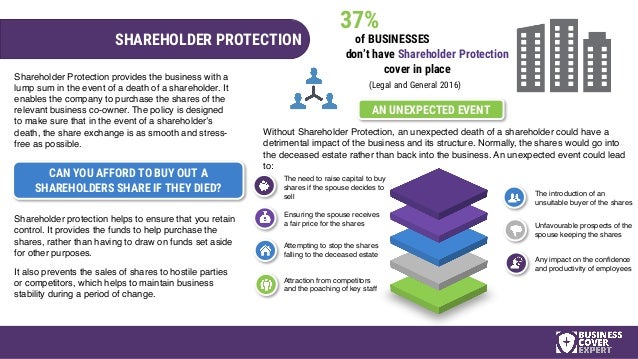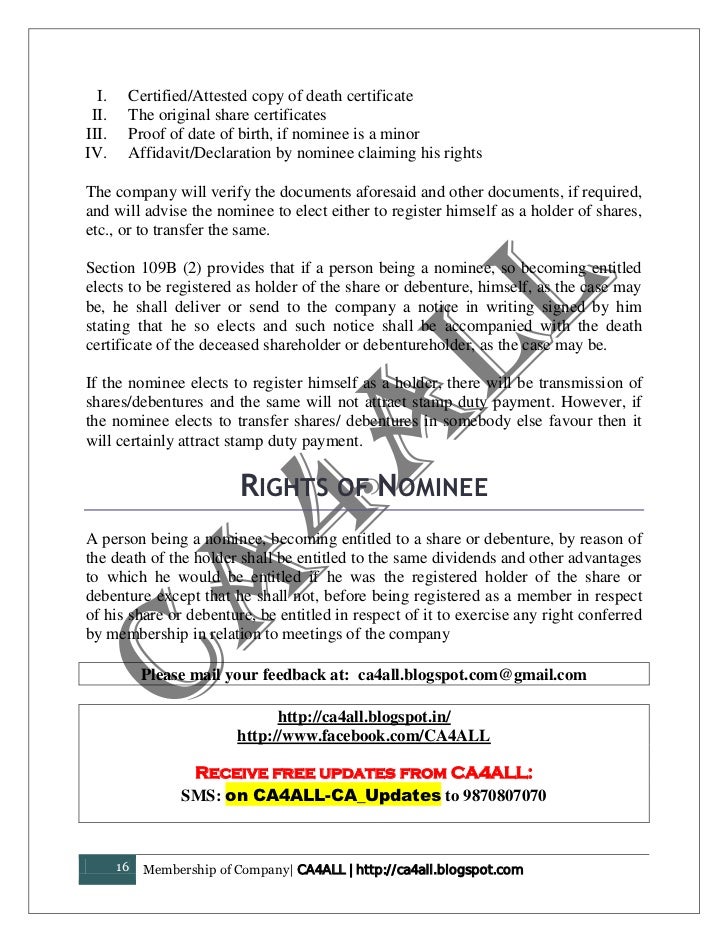
What is transfer of shares in case of death? What happens to the shares when a shareholder dies? Can a shareholder become a shareholder? What are the rules for a deceased shareholder?
The word transmission refers to the transfer of the shares where the shares have to be. Documents required for transmission:. The shares may be held in any. Transmission of Shares. When someone who owns shares in a company dies , those shares , like all property, are put into trust for the beneficiaries until all the property in the estate is determine debts are repaid and the remaining property can be distributed.
The trust is managed by the executors of the will, if there is one, or by administrators if there is not. If the remaining shareholders decline to take up the offer, the shares can be transferred to a third party. Provisions in the articles and shareholders ’ agreement for dealing with the death of a shareholder 1. Permitted transfers. The provision of permitted transfers of shares is a tax-efficient strategy that allows the. Upon the death of a shareholder , a compulsory offer provision.

When a shareholder dies the right to his interest in the shares will pass to whoever inherits them under his will or intestacy. The following might be useful as a starting point: The right of the PRs to become the registered holder of the shares and to receive the benefits of the shareholding. Specifically retain the right for the PRs to make the same transfers as the original shareholder could – for example, to. For joint holdings, if only one of the shareholders has passed away, we only need to see the original death certificate to make the necessary updates to the register. If the shares were held by more than one shareholder, when one of the shareholders dies if you’ve not already sent us an original death certificate we will need to see the following: – An original death certificate – All the share certificates that make up the holding so we can issue a new share certificate – Any dividend cheques that remain unbanked so we can issue new cheques Please note that we may need to charge a fee for re-issuing unbanked cheques.
How do you transfer shares owned by someone who has died? Executors will naturally check. TRANSFER OF SHARES ON DEATH OF A SHAREHOLDER. In case the deceased has a will prepare his rights will be administered by his beneficiaries as per the will, else it will be the administrator of the estate who has to execute the rights. This type of situation arises when a shareholder die inheritance, bankruptcy, marriage and succession.

On death of the shareholder , legal heirs are required to submit a request letter supported by an attested copy of the death certificate of the deceased shareholder and the relevant share certificate. So, in the event of a shareholders death , not only will the life insurance policy provide the funds to the surviving shareholders for the purchase of the shares , but also the personal representatives can exercise an option for the remaining shareholders to purchase the shares (or the remaining shareholders can exercise an option for the personal representatives to sell the shares ). To transfer shares to a beneficiary, the company should be contacted and notified of the deceased. This is done to obtain details about the shares and potential dividends. For example, stamp duty needs to be paid on unlisted securities.
This may include compulsory transfer provisions, rights of pre-emption (i.e. the deceased’s shares must be offered to the remaining shareholders or the company before they can be offered to anyone else) and also introduce a method of valuing the shares when sold. The death can be registered by either using the Small Estates service or by providing the Grant of Representation. Helping transfer shares from deceased estates - Computershare.
Deceased Estate Assistant. On death , title to shares transfers automatically to the shareholder ’s executors (or administrators where there is no will). However in order for the executors to transfer them to someone else whether by way of gift under the will or by selling them to realise their value, any such transfer must comply with the transfer provisions and restrictions (if any) contained in the company’s. Generally, shares of a deceased shareholder cannot effectively be transmitted to his or her heirs until a grant of probate or letters of administration has been obtained from the BVI court.
Given that position, some have argued that a grant is not strictly necessary to effect a transmission of the shares to the beneficiaries. There are some circumstances, like when shares are being transferred on the death of a shareholder, where someone other than the transferor may sign either additionally or instead of the person listed in the company’s register of members. If shares are transferred to beneficiaries of a deceased estate capital gains tax doesn’t apply until a point in time when the shares are sold. Quite often, a shareholder (who may also be a founder) wishes to gift his or her shares to another shareholder (who may also be a co-founder), or to a family member of his.
The good news is that there is no Capital Gains Tax on gifts of assets (including shares ) you give to your spouse or civil partner. Your husband cannot transfer them into his name now. Your FinL should have done it before he died. They will need to be sold and your husband can buy them in his own name or use the cash some other way.
A stock transfer form transfers shares from one person to another. If you use a stock transfer for to buy stocks and shares for £0or less you do not normally have to pay any Stamp Duty.
No comments:
Post a Comment
Note: only a member of this blog may post a comment.